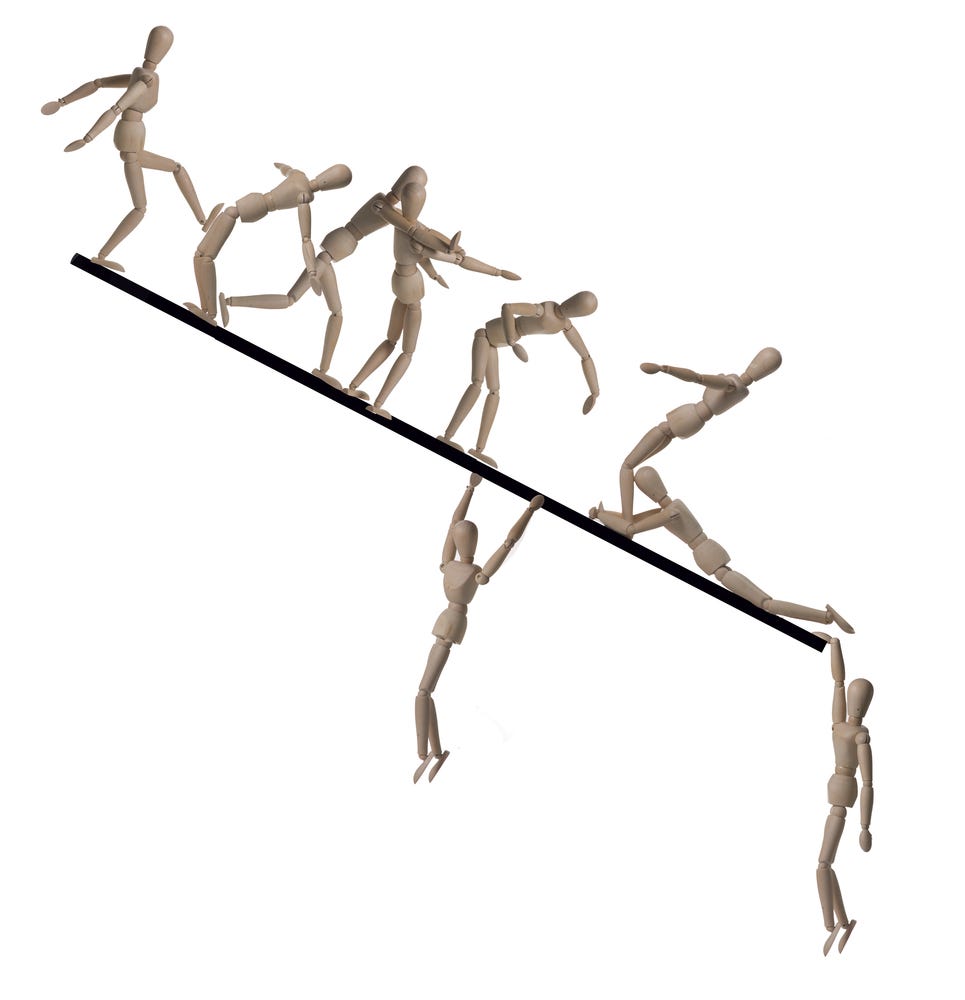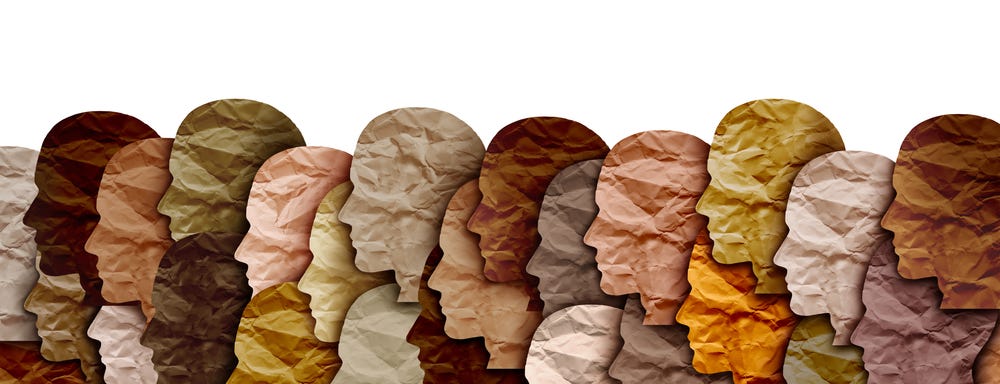E-Pluribus | September 9, 2022
Immaturity culture , slopes really can be slippery, and the place of race.
A round-up of the latest and best writing and musings on the rise of illiberalism in the public discourse:
Alan S. Rome: The Infantilization of Culture and History
Trigger warnings in some form or another are popping up everywhere. At Quillette, Alan Rome argues that often such 20-20 hindsight observations and cautions are insulting and counterproductive.
[T]he arrogant and immature idea that history is a monochromatic story of good and evil, of oppressors and oppressed, is becoming the dominant narrative of social respectability in elite institutions, the media, education, and everyday life.
This false understanding of history and human affairs, like many other false understandings, emerged in the universities. It informs prevailing contemporary approaches to the humanities found in fields as diverse as history, literature, sociology, gender, culture, and race studies. And it derives, through many intermediate steps, from Marxist assumptions that history is determined by social conflict and by the hidden, underlying power structures of society, rather than by the desires and intentions of individuals. These underlying power structures take many forms and, influenced by the waves of postmodernism of earlier decades, are now often conceived as linguistic and cultural in nature.
But they are all ultimately reducible—as is all human complexity, behaviours, and beliefs—to surface phenomena, or “superstructures,” that rest on the deeper base of material power relations. In history departments, these relations are sometimes half-jokingly referred to as the “holy trinity” of race, class, and gender. In the various standpoint theories of knowledge, a person’s position within these structures determines their very access to truth. Even if they are not quite so totalising, these structures always need to be critically “interrogated” and deconstructed in order to usher in a new era of freedom and equality.
All such approaches derive from a cynical view that society is only intelligible in terms of zero-sum power dynamics, which is never the case. Power is always relative and contextual and necessarily mixed with the rich variety of human life and experience. Ironically, many scholars in these fields believe themselves to be “anti-essentialists” or nominalists who reject generalisations as crude simplifications. In practice, however, they tend to operate with the crudest trans-historical categories of identity. Even the apparent complexity of intersectionality theory merely allows a person to be a member of multiple crude categories at once.
Read it all.
Benedict Beckeld: In Defense of Slippery-Slope Arguments
While slippery slope arguments can easily devolve into logical fallacy, Benedict Beckeld writes at City Journal that the rhetorical device has value nonetheless. Beckeld observes that the very natures of conservatism and progressivism make the latter’s ideas more prone to slippery slope arguments and thus gives more incentive to progressives to disparage the technique.
Usually, rejection of slippery-slope arguments occurs in the context of their claims that some policy will have bad consequences. These claims may be wrong, but the slippery-slope label does not prove their wrongness. Societies slide down such slopes all the time: history is full of examples of nations that moved in a progressive direction over time, tended toward decadence or exhaustion after altering rules for elites, and then relaxed moral standards. Indeed, the slippery-slope argument, especially in the context of social decay, has a noble pedigree. Plato observes in The Republic that democracy leads to authoritarianism; as freedom and equality expand beyond orderly limits, only hardheaded authority can rein them in. The fall of the Roman republic to authoritarian empire and the rapid collapse of French republicanism before the rise of Napoleon stand as examples.
Today’s slippery slopes are more familiar. Consider contemporary discussion over the nature of rights. While political conservatives generally define rights negatively (freedom from something), progressives define them positively (freedom to something). The preservation of negative liberties is definite and circumscribed, seeking to conserve a particular thing; the search for positive liberties is less bounded, aiming to widen the scope of what is alleged to be true freedom. Contemporary progressives tend not to be satisfied with certain political victories, which, once achieved, give way to new demands: for example, activists hoping to secure rights for sexual minorities initially made assurances that those who disagreed would be left alone; now they intend to stamp out dissent and expand the universe of rights beyond gay marriage. Given this history, one may be forgiven for suspicion of progressive intentions, or for concluding that the slippery slope is itself embedded in the progressive posture. It is also a definitional question. Whereas conservatism wishes to remain in one place, or, at most, to move only in certain limited respects, the very definition of progressivism is to progress—that is, to keep moving.
Read it all here.
Samuel Kronen: Humanizing Race
In a long piece for Discourse Magazine, Samuel Kronen explores the concepts of race and racism in society and how they tend to obscure the humanity that unites us all. While not dismissing race or racism out of hand, Kronen points out how much of the discourse around race consciously or unconsciously further divides us by focusing on real or imagined differences rather than what we have in common.
Like a collective Rorschach test, race acts as a blank canvas upon which different meanings are projected. This is not to say that studying race or racism is wrong, only that, when it comes to race, the margin for error is practically zero. There is very little incentive to say anything honest publicly about race issues, and there is too much to be gained through being dishonest.
Human beings are basically meaning-oriented and meaning-seeking creatures in an otherwise absurd universe, and—in my view—race is just an extension of this. It speaks to this vacuum of meaning that we’ve found so many complicated ways to make a big deal about something so inconsequential in our spiritual and romantic and personal lives.
What about racism? As far as I can tell, racism is any double standard based exclusively on race and nothing else. If you treat a Black person worse than a White person or vice versa in the same situation, I’m comfortable saying that’s probably racist. If someone makes a broad statement about an entire racial group in a way that could stigmatize individual members of that group, I’m going to go with racism. (As a general rule, especially in a multiethnic society, it’s just not a good idea to throw shade on entire races of people.)
Racism can express itself consciously through ideology, and it can have a structural dimension as a consequence of specific policies. Most of the time, I’d wager, racism emerges unconsciously from moment to moment out of expediency or convenience, sort of like being a jerk. Race is by no means the only historic justification for oppression, and racism is but one human evil among many.
Because of our supercharged racial history, however, there’s a sense that race and racism exist in their own galaxy apart from our own. There’s a human dimension to this issue that is conspicuously absent.
Read the whole thing.
Around Twitter
Alex Morey of the Foundation for Individual Rights and Expression on some of the responses to Carnegie Mellon professor Uju Anya’s tweet wishing “excruciating… pain” on the dying Queen Elizabeth:
Ayaan Hirsi Ali weighs in on Black Lives Matter and its place in education:
Matt Taibbi observes that many apparently believe liberal values are in the eye of the beholder:











